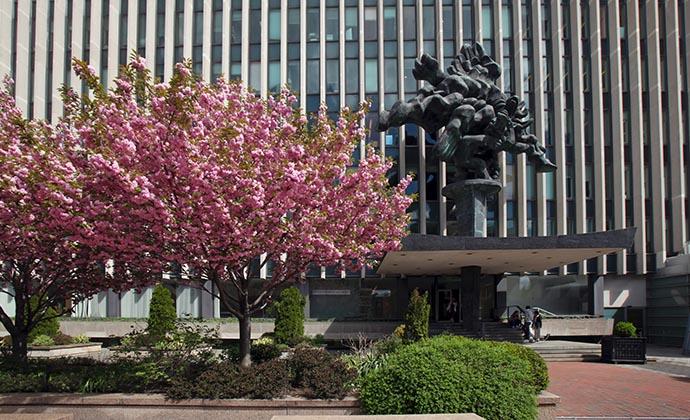New Spring Courses Cover Contemporary Issues
Columbia Law School’s commitment to providing its students with a cutting-edge legal education is evidenced by the 20 new courses being offered in the spring 2018 semester. Gillian Lester, Dean and the Lucy G. Moses Professor of Law, encouraged full-time and adjunct faculty to mine their scholarship and real-world experiences to create new courses that will engage students in up-to-the-minute legal, moral, and philosophical issues.
The new offerings focus on subjects such as electronic evidence; citizenship, religion, and identity; political and academic freedom; and the future of the administrative state. The Law School also offered five new one-week electives as part of a pilot program called “J-Term.”
Here is a preview of some of what students will be studying—and practicing—this semester:
Electronic Evidence & Discovery Workshop
These days, “paper trails” exist primarily in electronic form, and digital evidence comes up in most every lawsuit. This workshop taught by lecturer in law David Paul Horowitz, a renowned litigator, will give students an overview of the relevant rules of evidence and procedure, and a chance to apply what they’ve learned by drafting and arguing motions, engaging in mock-court conferences, and conducting direct and cross-examination of witnesses. Sitting judges and practicing attorneys will serve as guest lecturers.
International Criminal Investigations
Tax evasion, bribery, cyber theft, money laundering, and other crimes that cross borders are among the most challenging and compelling problems in white-collar criminal prosecution and defense. Lecturer Frederick Davis will have students consider the limits on nations’ power to fight crime outside their territories while addressing new twists on traditional procedures to fight international white-collar crime, from extradition to evidence searches. Students will also learn about the roles of investigative institutions such as the International Criminal Court and Interpol.
Lawyer Leadership: Leading Self, Leading Others, Leading Change
This intensive, interactive seminar combines academic and hands-on learning experiences that will provide students with a set of core leadership competencies so that they can build community and effect change. Taught jointly by Professors Susan Sturm and Elizabeth Emens, along with Emily Gould, a leadership coach and consultant, the course is part of a new leadership initiative launched this past fall in collaboration with Davis Polk.
Constitutional Design in Post-Conflict Democracies
Lecturer in law and research scholar Menaka Guruswamy offers a class that explores why democratic constitutionalism has endured in some divided societies and not in others. Students will contrast the successes and failures of constitutional democracies such as India, Pakistan, Egypt, Tunisia, Libya, and Afghanistan. Scholarly writings as well as contemporary news reporting will be used to examine the creation of various constitutions.
Freedom: Individual, Political and Academic
Freedom as a concept is complex and has a long and varied intellectual history. Columbia University Professor Jonathan Cole will introduce students to the theoretical underpinnings of political freedom (with readings by John Stuart Mill, John Rawls, Karl Marx, and Isaiah Berlin) while focusing on the link between freedom and democracy. Students will engage in discussions of how the core principles of freedom relate to academic institutions and in particular current controversies around free speech on American campuses.
Citizenship, Religion, Identity
Religious identity—whether unifying populations or challenging the tenets of dominant cultures—has become a contentious social and political issue, both domestically and internationally. Professor Jamal Greene will lead students in an exploration of the ways in which democracies manage the relationship between religion and the state. Prominent speakers from many countries, disciplines, religious traditions, and constitutional cultures will present papers that acknowledge these conflicts and offer avenues toward solutions in the context of contemporary constitutional democracies that are religiously pluralistic, multicultural, multi-ethnic, and ideologically divided.
Rebuilding Government
The focus of this class co-taught by Professors Charles F. Sabel and William H. Simon will be the theory and practice of public institutional design, with an emphasis on recent efforts to make government more adaptable and more accountable. Case studies will include initiatives in the U.S. and the European Union covering air pollution, health and safety, social welfare, and police and prison reform.
Civil Rights Lawyering in the Modern Era: Theory and Practice
In a seminar taught by Professor Kendall Thomas and lecturer in law Kristen Clarke ’00—with guest experts from government and NGOs—students will engage with contemporary civil rights issues that have been front and center in current policy debates and recent Supreme Court cases involving voting rights, employment discrimination, access to education, fair housing, and fair lending. Students will gain skills in preparing an investigative report that summarizes the legal and policy framework for a specific civil rights problem and propose concrete litigation strategies as solutions.
Information Privacy
Information privacy law in the U.S. affects almost all individuals, businesses, and administrative agencies today. Professor Clarissa Long will lead students to explore the growing number of statutes governing varying degrees of control over bundles of information that can be used on their own or with other information to identify, find, or contact a single person, or to identify an individual in a particular context. The seminar will focus primarily on the rights of private actors in civil law settings.
Check out our full listings of curricular offerings, including seminars, clinics, and externships.
